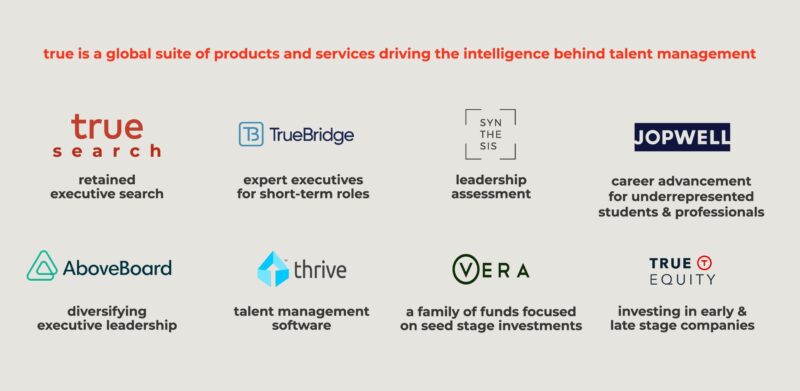Great talent has always been integral to developing cutting-edge artificial intelligence solutions. Since it’s founding, True Search has done steady work with AI-enabled companies and platforms, accounting for 12% of True’s placements over the past five years.
But while this work has remained constant, it’s clear something about AI hiring has changed: there has been an exponential increase in momentum and opportunity for impact.
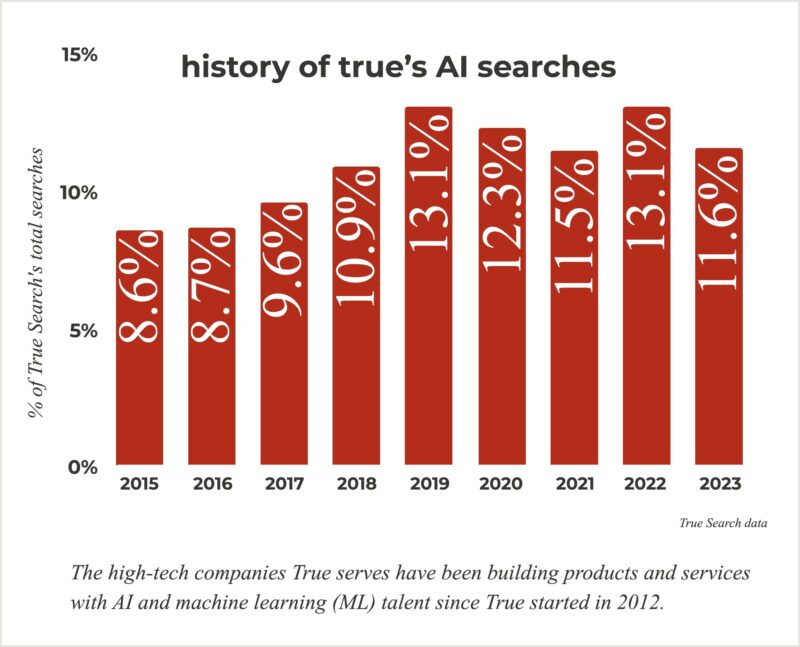

Now that ChatGPT can write an email or a kids’ bedtime story in seconds, AI has permeated mainstream consciousness, transforming into both a buzzword and a readily accessible tool employed by individuals in nearly every domain. It dominates headlines, and even Congress is grappling with the implications on Capitol Hill. That ubiquity is translating into an increased demand for expert AI talent and desire for the potential advances they will lead.
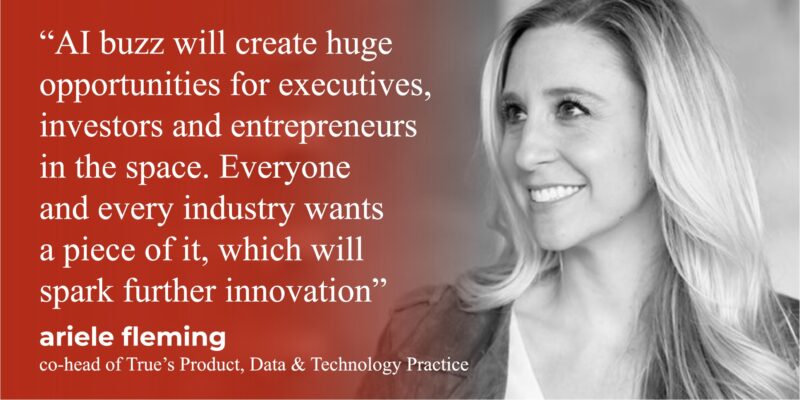
The Wall Street Journal reported this May on “boom times” for startups touting generative AI technologies, with Pitchbook estimating the generative AI market rising to $98 billion in 2026 and almost $42.6 billion this year.
But as True clients and candidates know, generative AI is just one part of the story. There exist numerous other areas where AI demonstrates potential for sustained advancement and, quite possibly, rapid acceleration: from smarter healthcare, to self-driving cars, to climate change solutions, to personalized shopping experiences. And all those companies will need to fight it out for the limited pool of highly-skilled talent that is ready to seize the AI moment.
“AI is rapidly transforming the way we interact with our digital and physical worlds,” said partner Mike Greene, co-lead of Product, Data & Technology practice. “Companies in all industries are finding ways to leverage both traditional and generative AI.”
We’ll examine the pain points arising from this massive opportunity for our clients, and how executive talent can position themselves to solve for them.
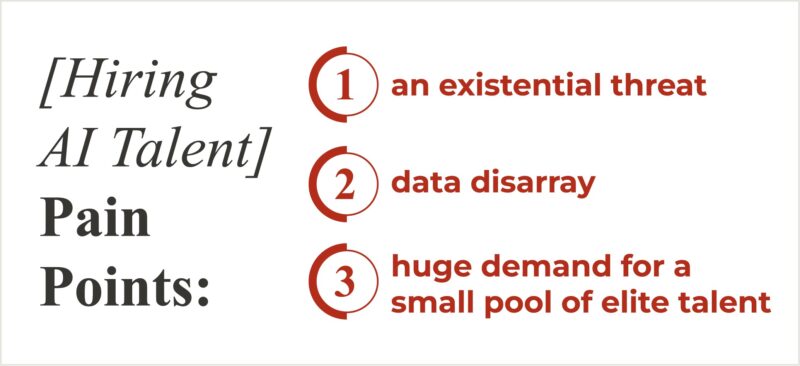

Rapid advances in AI technology present incredible opportunities to those able to lead through this time, but they also can appear to threaten some companies’ core offerings.
Millions of the world’s most active developers and technologists visit Stack Overflow every month to ask questions, learn, and share technical knowledge. Every developer knows True’s client Stack Overflow as the authoritative center of knowledge for any question about programming or coding. Like many other global sites, Stack Overflow has seen the potential to divert traffic away from Stack message boards with the rise of tools like OpenAI ChatGPT and GitHub’s CoPilot over the last few months.
But for CEO Prashanth Chandrasekar, the perceived “threat” is quite the opposite. He sees the rise of GenAI as an opportunity to mobilize the strength and reputation of the Stack community’s shared knowledge to “craft models that reward the users who contribute and keep the knowledge base we all rely on open and growing, ensuring we remain the top destination for knowledge on new technologies in the future.”
Chandrasekar is recruiting for new talent to lead Stack through this moment.
“Stack hired True to help them find their next chief product officer, and that person is going to be solely focused on how they can build their next version of products that are incorporating generative AI,” says Product, Data & Technology partner Mark Bai, who is leading the search with practice co-lead, Mike Greene.
The recruiting team is seeking profiles with a track record of working on AI-focused products that are being built, delivered, and commercialized specifically in the enterprise, with a specialization in developer tools. The role presents a fascinating opportunity for executive candidates.
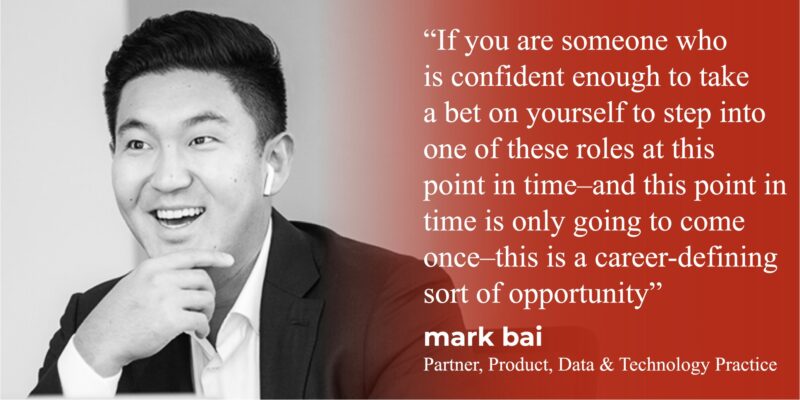
“If they can figure out the right playbook to get Stack Overflow over this existential hurdle, they 10x the amount of opportunities that they’ve then opened up for themselves after this run,” Bai said.
Opportunities are there for executives ready to seize the moment, and for technology companies open to the possibilities of the future.
“My prediction is that, far from the job of programmer disappearing, we’ll end up with millions of new software developers, as workers from fields like finance, education, and art begin making use of AI-powered tools that were previously inaccessible to them,” Chandrasekar said in an essay on The Overflow blog. “We are enthusiastic about welcoming this next generation of developers and technologists and providing them with a community and with solutions.”

Just as Stack Overflow is built on the strength and openness of its community data, AI technology relies on the quality and power of data. Without usable data, AI is impossible. Companies know that, which means leaders that can manage that massive challenge will be at a premium.
Ariele Fleming related how she was talking about AI with an esteemed chief technology officer of a leading healthcare cloud company built on FHIR® that allows healthcare businesses the interoperability to connect, control and compute healthcare data.
“They said, ‘AI is nothing new. It’s all about the data, right?’” Fleming recalled. “It’s data consistency, data cleanliness, and having data in usable formats that’s a real problem for a lot of industries, especially legacy industries that have been very slow to adopt modern technology. That’s a huge pain point.”
At larger companies, the need becomes huge: There’s more data being processed, more data to drive insights on, and large engineering organizations building algorithms running on top of those platforms. The bigger the company, the bigger the data problem, the more senior a leader is needed.
True has done a number of searches for that key person to oversee such a platform. That title could be chief data officer, VP of data, VP of machine learning (ML), or VP of data engineering. They’ll often report to a chief technology officer (CTO).
When the Product, Data & Technology practice talks to clients looking to invest in AI talent, the recruiters start the conversation at the base level. They focus on what is proprietary and unique about a company’s data set, how the client can use it to develop a competitive advantage, and acquire the talent necessary to build the platform and AI/ML tools to unlock the power of their data.
Top talent is looking for commitment from the leadership team and their board.
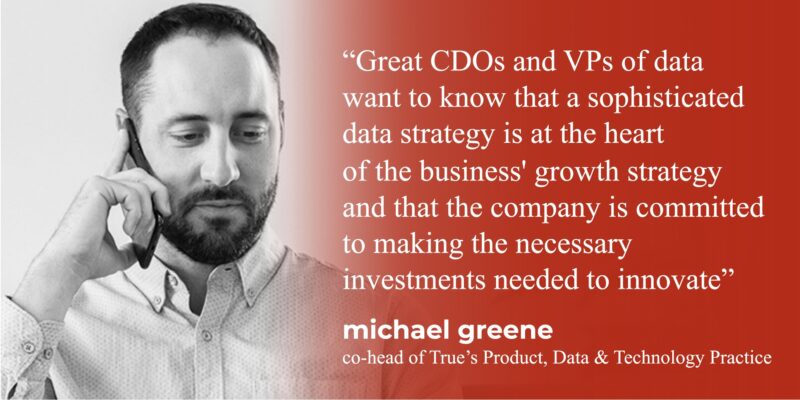
It’s a race to find talent that can turn data into a competitive advantage.

Companies are engaged in an increasingly challenging battle to attract tech and data talent with the ability to integrate AI into their products. There was already a shortage of exceptional engineers, which is further magnified when narrowing the focus to AI expertise.
To Chandrasekar’s point about the potential for millions of new programmers, there is the possibility that generative AI will transform normal developers into 10x developers. But that just ups the value of those leaders who can offer something more.
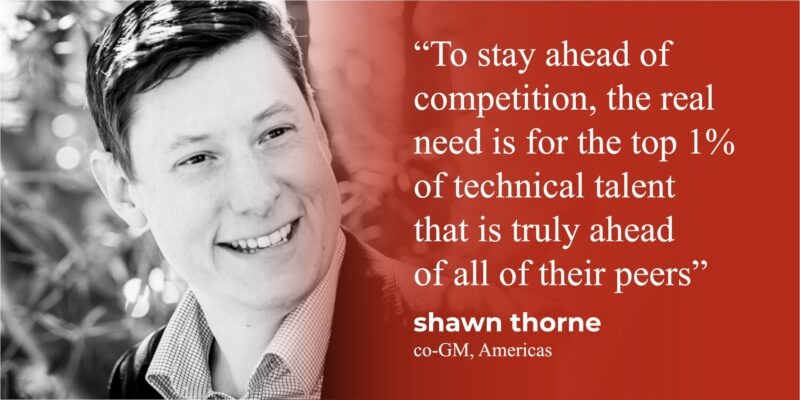
“It’s an arms race for top talent as even some of the largest companies face disruption from AI,” Thorne said.
As AI becomes more of a necessity across industries, even traditional companies are hiring cutting-edge technologists. Fortune 500 companies are especially active in this regard, as they have the resources to hire senior leaders and prioritize the development of data and AI organizations.
“All the quant trading firms and financial services are going after these people. All the top companies are going after these people. Every single startup founder wants them. Every single company that’s getting disrupted, they all want some of these folks,” said Bai. “The people that have these capabilities, they are going to be sought after by every single sector of the economy.”
Naturally, this demand will drive up compensation packages.
“Finding the right product, data and technology leaders will always be a premium within the tech space, both now and in the future,” said Fleming.
While companies and universities should consider upskilling workers for this AI-driven future, it is not a quick fix for companies urgently seeking talent. Upskilling and training take years and a lot of companies just don’t have the time or resources.
“In my mind, it’s more cost-effective to hire an executive search firm to find the right person to make a quicker and more meaningful impact on the business,” Fleming said. “It’s still a relatively small ecosystem. We know where great leaders are, both established and emerging, and have had relationships with them for as long as I can remember. But there is still not enough expertise in this field, creating a supply and demand problem.”

This is the career-defining moment for those who can seize this AI opportunity.
“Technology leaders want to solve the hardest, latest, greatest problems. AI is going to be a really attractive thing for people who want to build, transform and solve problems that have not yet been solved,” said Fleming
At present, technology and AI are driving massive advancements in every sector. There is a tremendous opportunity for candidates who want to make AI a focal point of their careers and have a positive impact on these industries. It’s an exciting time for sought-after technologists, the companies in need of their expertise, and the recruiters who know how to find them.
—
For True’s latest thought leadership and data analysis: subscribe to True Insight.
Want to get in touch? hello@trueplatform.com
Contact True leaders in this article: Ariel Donahue Fleming, Mark Bai, Mike Greene, Shawn Thorne
